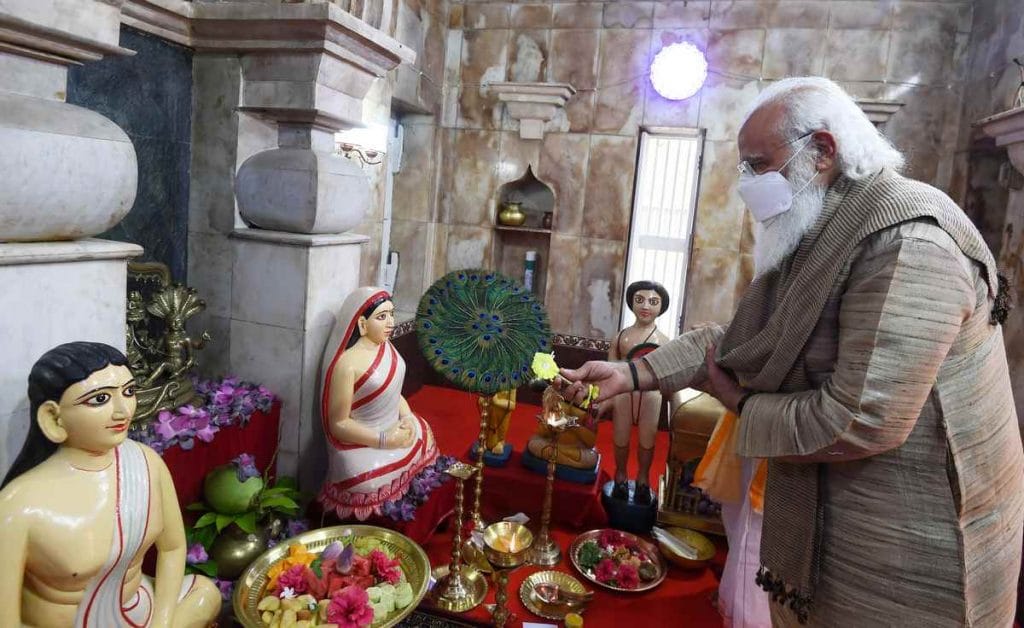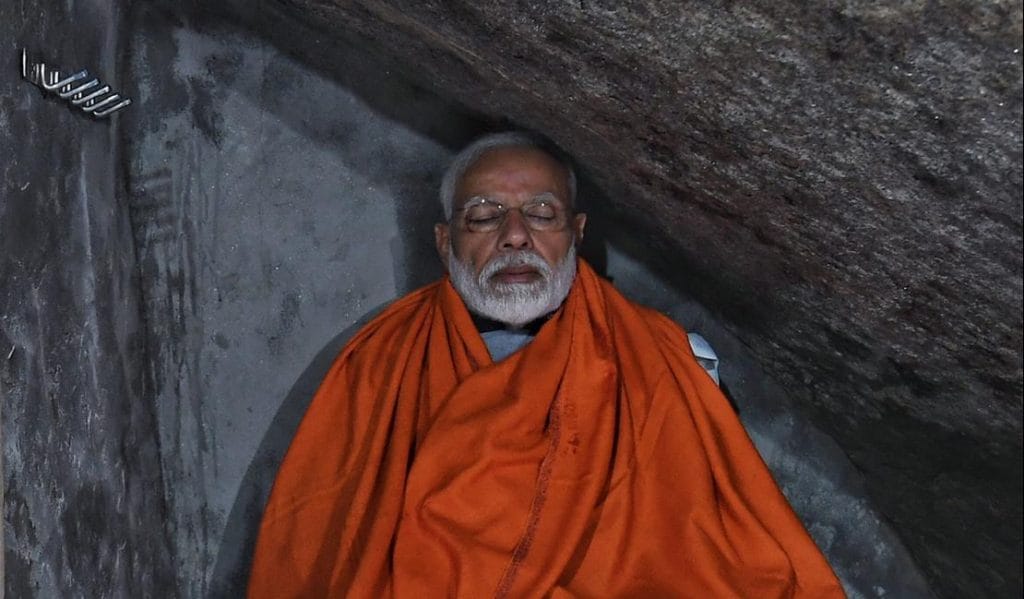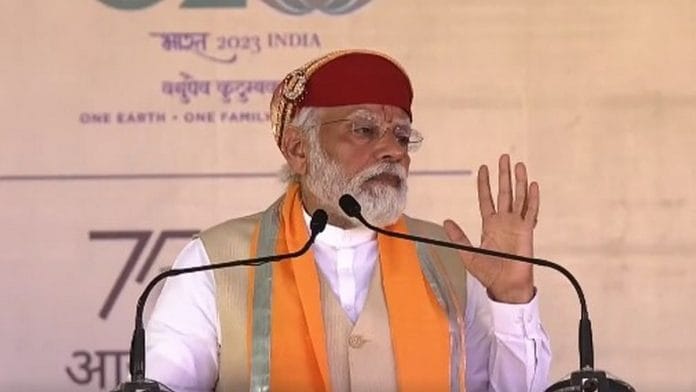New Delhi: As polling was underway in Karnataka Wednesday, Prime Minister Narendra Modi was addressing a rally in Rajasthan, accusing the Congress of exposing the identity of people from Karnataka’s Hakki Pikki tribe stranded in war-torn Sudan, while his government was trying to evacuate them. He also spoke in detail about the tribe’s links with Maharana Pratap and how they didn’t bow before the Mughals.
The Prime Minister’s speech in Rajasthan was being televised live, while the ‘silence period’ — for 48 hours until polling closes — under the Model Code of Conduct (MCC) was in force in Karnataka. Technically, there was no violation of the MCC because the speech was not being made “in the polling area”.
On 9 May, a day before the elections and when the “silence period” was on, the PM had tweeted a letter and a video appeal to Karnataka voters, prompting the Congress to go to the Election Commission and complain about the alleged MCC violation.
Incidentally, the same day, Congress president Mallikarjun Kharge had also tweeted an appeal to Karnataka voters saying that a vote for the Congress is a guarantee for change, progress, and welfare.
According to Section 126 (1)(b) of the Representation of the People Act, 1951, it is prohibited to “display to the public any election matter by means of cinematograph, television or other similar apparatus in polling area during the period of 48 hours” during the ‘silence period’.
Significantly, the tweets by Kharge and Modi as well as the PM’s televised speech during the silence period in Karnataka were posted and made outside the “polling area”.
The MCC is silent about what happens if politicians continue to campaign through social media or televised rallies from outside the state during the ‘silence period’.
Should the MCC, therefore, be amended to close such gaps?
Speaking to ThePrint, former Chief Election Commissioner (CEC) S. Y. Quraishi said the Model Code of Conduct in its present form is sufficient if implemented even-handedly.
Senior Congress leader Pawan Khera, on the other hand, argued that a code of conduct should be established specifically for broadcasters, as he claimed they tended to provide biased coverage favouring the ruling Bharatiya Janata Party (BJP).
Meanwhile, R.P. Singh, national spokesperson of the BJP, told ThePrint that the PM cannot stop his work just because elections happen to be on in some states.
“The Prime Minister is going to Rajasthan for some other objective. You can’t hold the work of a complete country. These are obligations that the Prime Minister has to fulfill,” Singh said.
Nevertheless, an analysis by ThePrint shows that over the last nine years, the Prime Minister has frequently addressed televised rallies and other functions during elections, usually from outside the polling areas, arguably leveraging this gap in the MCC.
2022: UP, Manipur, Goa
The Prime Minister found various ways to make his voice heard immediately before people cast their votes in the Uttar Pradesh, Goa, and Manipur assembly elections last year.
A day before UP voted for the first phase of assembly elections on 10 February 2022, Prime Minister Narendra Modi’s interview with the news agency ANI, made a lot of buzz.
In the interview, the PM championed the performance of UP Chief Minister Yogi Adityanath.
“The criminals in UP used to rule over the law and order of the state, but today, even the daughters of UP can roam around without any fear at any time of the day,” Modi said. “Yogiji (Yogi Adityanath) has given prominence to safety and security in the state.”
Days later, M.G. Devasahayam, former IAS officer and author of Electoral Democracy?: An Inquiry into the Fairness and Integrity of Elections in India, alleged that the PM had violated the model code of conduct in giving the interview.
In an article for the news portal The Quint, Devasahayam specifically mentioned Section 126 (3) of the Representation of the People Act, which prohibits candidates and campaigners from putting out “election matter” calculated to influence voters in the 48 hours before polling ends, including through TV.
“Yet, that is precisely what the Prime Minister did in the interview he gave to ANI on the eve of the first phase of polling for the Uttar Pradesh assembly election on 10 February,” Devasahayam wrote in the article.
Then, when Goa was voting on 14 February, the PM mentioned the state and its voters directly in a UP rally.
In his speech, he criticised Trinamool Congress leader Mahua Moitra, without naming her, with reference to an interview in which she had purportedly claimed that her party had prevented the consolidation of the Hindu vote in Goa.
“She said her party has forged an alliance so that the Hindu votes in Goa could be divided. You see this himmat (audacity). Is this democracy? Is this secularism? You are openly saying you want to divide the Hindu votes. Then whose votes are you trying to gather?” the PM asked. “I would like to say to the voters of Goa, that this is the opportunity to bury this type of politics.”
Meanwhile, on the day Manipur went for assembly elections on 28 February last year, Modi mentioned the government’s development vision for the “northeast” in a video address to a post-budget conference in Guwahati on PM GatiShakti, a government infrastructural and connectivity plan.
“Our government is also committed to the balanced development of the Northeast. Keeping in view the requirements of these states, the PM-DevINE (Development Initiative for North Eastern Region) scheme has also been announced at a cost of Rs 1,500 crore,” he said in his video address.
2021: West Bengal and Tamil Nadu
PM Modi’s visit to Bangladesh on the first day of polling in West Bengal on 27 March 2021 drew criticism from Chief Minister Mamata Banerjee, who said it was a violation of the poll code and could sway results.
On the day of the voting, Modi offered prayers at a temple in Orakandi, the birthplace of Harichand Thakur, the spiritual figurehead of the Matua community. He also met members of the community.

“I am feeling the same emotions my Matua brothers and sisters in India feel coming to Orakandi,” PM Modi said in speech there.
Political experts believe that the Matuas, who trace their ancestry to Bangladesh, could have a direct or indirect influence on up to 70 assembly seats in West Bengal, the India Express reported.
On 6 April, the day Tamil Nadu, Kerala, and Puducherry went for assembly elections, the Prime Minister was highly visible too. While he did not mention the states and Union territory, his address to BJP workers on the party’s “foundation day” was telecasted and reported widely.
2020: Bihar
In Bihar’s three-phased assembly elections between 28 October and 7 November 2020, Modi addressed a rally in Darbhanga in the first phase. “Youth will get government jobs and also in the industries established by private investors. But if ‘jungle raj’ forces form the government, the investors will run away,” he said.
While the last phase was underway, Modi addressed an “official function”— the 51st annual convocation of IIT Delhi via video conferencing.
“India is fully committed to giving its youth ease of doing business so that they, through their innovation, can bring about a change in the lives of crores of people of the country,” he had said.
Prime Minister Modi was is the BJP’s main face in Bihar, where the party lacks a strong local leadership. According to reports, Bihar is amongst India’s youngest states.
2019: Lok Sabha polls, Jharkhand elections
A day prior to the last day of polling in the Lok Sabha elections, Modi’s pictures from Kedarnath, meditating in a cave, were released. A day later, on the polling day, he spoke to the media and expressed his “special relationship” with Kedarnath and the masterplan of the town.

Some opposition parties, including the Trinamool Congress and Telugu Desam Party, were quick to protest, terming it as a violation of the MCC.
“Election campaign for the last phase of polling for Lok Sabha polls is over, surprisingly Narendra Modi’s Kedarnath Yatra is being widely covered by the media for the last two days. This is a gross violation of the model code of conduct,” wrote TMC in a letter to the Election Commission.
In the 2019 Jharkhand assembly elections, the first polling day, 30 November, collided with six months of Modi 2.0.
On the occasion, Modi took to Twitter to extoll various achievements of his government at the half-year mark.
“From ending of Article 370 to economic reform, productive Parliament to decisive foreign policy, historic steps are taken,” he said in one tweet.
2018: Karnataka, MP, Rajasthan, Meghalaya, and more
Five years ago, when Karnataka was voting on 12 May, Modi visited Nepal’s iconic Pashupatinath Temple. The Congress immediately claimed that he was trying to sway voters via visits to Hindu sites of worship.
“As there is a model code of conduct in Karnataka, PM Modi planned to pray at temples in Nepal instead, just to influence voters. This is not a good trend for democracy. Why did he only choose today as the day?” NDTV had then quoted senior Congress leader Ashok Gehlot as saying.

The same year on 27 February, when Meghalaya and Nagaland were out to vote for assembly elections, Modi took on the Congress while making a speech in Davanagere, Karnataka.
“Election after election what are the people doing? They are removing Congress. When Congress goes, the harmful Congress culture also goes,” he said.
Later that year, when Chhattisgarh voted on 12 November, Modi made a widely covered speech in his home constituency Varanasi.
“Now, the country wants only politics of development. People take their decisions on the basis of development and not on vote bank politics,” Modi said.
Then, on 28 November, the day Madhya Pradesh and Mizoram went to polls, Modi attacked Rahul Gandhi from Rajasthan. He said the battle was between those who worked (kaamdaar) and dynasts (naamdaar). “We are not seeking votes for our grandsons or granddaughters but for your welfare,” he had said.
When Rajasthan and Telangana voted on 7 December, Modi made a speech in Delhi on the occasion of the 75th anniversary of the popular daily Dainik Jagran. “Why is the country still backward so many decades after independence?” he asked.
2017: Uttar Pradesh and Gujarat
During the 2017 assembly elections in Punjab, Goa, Uttarakhand, and Manipur, Prime Minister Modi delivered a speech on each voting day — 4 February for Goa and Punjab, 15 February for Uttarakhand, and 4 and 8 March for Manipur.
These speeches were all delivered from UP, which was also undergoing a phased election that year, from 11 February to 8 March.
When the first phase of voting took place in Uttar Pradesh on 11 February, Modi criticised Akhilesh Yadav, then incumbent CM, during a speech in Badaun. Notably, Badaun was scheduled to go to polls in a subsequent phase.
A day prior to the last day of polling in Uttar Pradesh, Modi gave a speech at the release of the Commemorative Postage Stamp on 100 Years of Yogoda Satsang Math. Here he said, “India’s spirituality is India’s strength.”
Spirituality and religion, it should be noted, were significant components party’s political campaign in Uttar Pradesh.
Similarly, while the first phase of voting was underway in Gujarat on 9 December, Modi took the opportunity to target Rahul Gandhi and the Congress.
On the last day of voting, 14 December, when no election-related activities were permitted, Modi rode in an open car after casting his vote, which attracted large crowds. The Congress had referred to this as a “roadshow.”
2015: Bihar polls
The 2015 Bihar assembly elections took place across five phases.
A day prior to polling in Bihar’s first phase, 12 October, Modi made a speech about caste and reservation, which are key issues in the state, during a speech in Mumbai.
“We believe in the principles of Dr Ambedkar and his teachings of inclusive growth. The reservation policy is something Dr Ambedkar gave to the country and no power can take it away.”
It was again televised and got prominent in social media.
Also read: While BJP & Congress clash over Bajrang Dal, all Bengaluru voters really want is employment, loans
Is MCC’s current form sufficient?
According to former CEC Quraishi, the Model Code of Conduct in its current form is sufficient if implemented fairly.
“More than changes in the MCC, the question is about the enforcement of MCC. That should be implemented properly and a level playing field should be maintained. Otherwise, the Model Code of Conduct, to my mind, is quite sufficient, if we implement it even-handedly.” said Quraishi talking about national political leaders in general.
He added that if the election is in Tamil Nadu, then why should Punjab be affected? “Country is bigger than the state,” he said.
“There is no ban in Rajasthan. One is smart enough to use this provision of the law,” he added.
Pawan Khera, chairman of the media & publicity department of the Congress, also believes that the current MCC is sufficient, but a code of conduct is needed for broadcasters to maintain a level playing field.
“There has to be some code of conduct which applies especially to broadcasters because this is not a level playing field. The Prime Minister gets all the coverage when there is a period of silence,” he said.
Khera claimed that this issue existed throughout political campaigns.
In any case, there is no level playing field during the campaign. The kind of coverage that the ruling party gets compared with the opposition is a story of a total lopsided coverage”, Khera told ThePrint.
According to Khera, it was up to the Election Commission to assert itself. All that it takes is for the EC to use more teeth,” he said.
Meanwhile, R.P. Singh, national spokesperson of the BJP, told ThePrint that the PM cannot stop his work just because elections happen to be on in some states.
“The Prime Minister is going to Rajasthan for some other objective. You can’t hold the work of a complete country. These are obligations that the Prime Minister has to fulfill,” Singh said.
Singh added that the media cannot be prevented from reporting on noteworthy events.
“If some incident happens in a place where there is an election, obviously there will be a political reaction to it. If some serious incident happens in Delhi, I have to react to it. Even if it will affect elections in Punjab I have to react,” he said. “I can’t do anything about it.”
(Edited by Richa Mishra)






